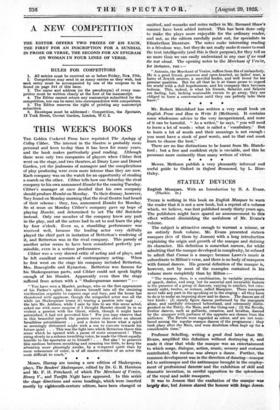THIS WEEK'S BOOKS
THE Golden Cockerel Press have reprinted The Apology of Colley Cibber. The interest in the theatre is probably more personal and keen to-day than it has been for many years, and the book makes particularly good reading. Although there were only two companies of players when Libber first went on the stage, and two theatres, at Drury Lane and Dorset Garden, yet the jealousies of managers and the complications of play producing were even more intense than they are now. Each company was on the watch for an opportunity of stealing a march on the other. Cibber tells how one Saturday the rival company to his own announced Hamlet for the coming Tuesday, Cibber's manager at once decided that his own company should produce Hamlet on Monday. To their dismay, however, they found on Monday morning that the rival theatre had heard of their scheme : they, too, announced Hamlet for Monday. So at noon on Monday Cibber's company gave up hope of playing Hamlet, and determined to act The Old Batchelor instead. Only one member of the company knew any part in the play, and all the actors had to set to and learn the play by four o'clock. Even so, a stumbling performance was received well, because the leading actor very skilfully played the chief part in imitation of Betterton's rendering of it, and Betterton was in the rival company. This parody of another actor seems to have been considered perfectly per- missible, even in a serious performance.
Cibber was a very shrewd critic of acting and of plays, and he left excellent accounts of contemporary acting. When he first went on the stage his company included Betterton, Mrs. Bracegirdle and Kynaston. Betterton was famous for his Shakespearean parts, and Cibber could not speak highly enough of his Hamlet. Apparently even then the stage suffered from actors with a " Shakespearean manner
" You have seen a Hamlet, perhaps, who on the first appearance of his Father's spirit, has thrown himself into all the straining vociferation requisite to express rage and fury, and the house has thundered with applause, though the misguided actor was all the while (as Shakespeare terms it) tearing a passion into rags . . . the late Mr. Addison, while I sate by him to see this scene acted, asked me with some surprise if I thought Hamlet should be in so violent a passion with the Ghost, which, though it might have astonished, it had not provoked him ? For you may observe that in this beautiful speech the passion never rises above en almost breathless astonishment . . . and a desire to know what a spirit so seemingly distressed might wish a son to execute towards his future quiet . . . This was the light into which Betterton threw this scene which he opened with a pause of mute amazement ! Then rising slowly to a solemn trembling voice, he made the Ghost equally terrible to the spectator as to himself ! . . . But alas ! to preserve this medium between mouthing and meaning too little, to keep the attention more pleasingly awake, by a tempered spirit than by mere vehemence of voice, is of all master-strokes of an actor the most difficult to reach."


































 Previous page
Previous page